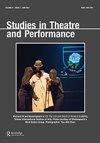{"title":"展览策展作为实践-研究的表演史学:一个不完整的观众体验故事","authors":"Kate Holmes","doi":"10.1080/14682761.2022.2105544","DOIUrl":null,"url":null,"abstract":"Taking an interdisciplinary approach to information-led exhibitions focused on performance can be considered practice-as-research historiography if curation is engaged with as praxis. Approaching exhibition curation as research praxis is a knowledge-making process, reconfiguring exhibitions as far more than a ‘pathway to impact’ designed at securing a grant. In the curation of two linked exhibitions on nineteenth-century popular entertainments at the Bill Douglas Cinema Museum and University of Bristol Theatre Collection, which were stunted due to COVID-19, I developed an argument for the shared ground of exhibitions and performance. If archival objects can perform, the exhibition space itself is a stage through which they communicate embodied meanings to audiences. I explore how exhibition curation generates different epistemologies to written research by putting museum studies, performance history, audience studies and performance practice-as-research in conversation. I demonstrate how museum studies could benefit from performance in developing epistemological arguments, and how performance studies can more significantly privilege the audience in the knowledge production process. I conclude my findings by discussing how planned activities and lessons learnt from these exhibitions could provide a blueprint for practitioners interested in using the exhibition form and format to conduct historically relational practice-research inquiries in conversation with audiences. © 2022 The Author(s). Published by Informa UK Limited, trading as Taylor & Francis Group.","PeriodicalId":42067,"journal":{"name":"Studies in Theatre and Performance","volume":"27 1","pages":""},"PeriodicalIF":0.3000,"publicationDate":"2022-07-26","publicationTypes":"Journal Article","fieldsOfStudy":null,"isOpenAccess":false,"openAccessPdf":"","citationCount":"0","resultStr":"{\"title\":\"Exhibition curation as practice-as-research performance historiography: an incomplete story of audience experience\",\"authors\":\"Kate Holmes\",\"doi\":\"10.1080/14682761.2022.2105544\",\"DOIUrl\":null,\"url\":null,\"abstract\":\"Taking an interdisciplinary approach to information-led exhibitions focused on performance can be considered practice-as-research historiography if curation is engaged with as praxis. Approaching exhibition curation as research praxis is a knowledge-making process, reconfiguring exhibitions as far more than a ‘pathway to impact’ designed at securing a grant. In the curation of two linked exhibitions on nineteenth-century popular entertainments at the Bill Douglas Cinema Museum and University of Bristol Theatre Collection, which were stunted due to COVID-19, I developed an argument for the shared ground of exhibitions and performance. If archival objects can perform, the exhibition space itself is a stage through which they communicate embodied meanings to audiences. I explore how exhibition curation generates different epistemologies to written research by putting museum studies, performance history, audience studies and performance practice-as-research in conversation. I demonstrate how museum studies could benefit from performance in developing epistemological arguments, and how performance studies can more significantly privilege the audience in the knowledge production process. I conclude my findings by discussing how planned activities and lessons learnt from these exhibitions could provide a blueprint for practitioners interested in using the exhibition form and format to conduct historically relational practice-research inquiries in conversation with audiences. © 2022 The Author(s). Published by Informa UK Limited, trading as Taylor & Francis Group.\",\"PeriodicalId\":42067,\"journal\":{\"name\":\"Studies in Theatre and Performance\",\"volume\":\"27 1\",\"pages\":\"\"},\"PeriodicalIF\":0.3000,\"publicationDate\":\"2022-07-26\",\"publicationTypes\":\"Journal Article\",\"fieldsOfStudy\":null,\"isOpenAccess\":false,\"openAccessPdf\":\"\",\"citationCount\":\"0\",\"resultStr\":null,\"platform\":\"Semanticscholar\",\"paperid\":null,\"PeriodicalName\":\"Studies in Theatre and Performance\",\"FirstCategoryId\":\"1085\",\"ListUrlMain\":\"https://doi.org/10.1080/14682761.2022.2105544\",\"RegionNum\":3,\"RegionCategory\":\"艺术学\",\"ArticlePicture\":[],\"TitleCN\":null,\"AbstractTextCN\":null,\"PMCID\":null,\"EPubDate\":\"\",\"PubModel\":\"\",\"JCR\":\"0\",\"JCRName\":\"THEATER\",\"Score\":null,\"Total\":0}","platform":"Semanticscholar","paperid":null,"PeriodicalName":"Studies in Theatre and Performance","FirstCategoryId":"1085","ListUrlMain":"https://doi.org/10.1080/14682761.2022.2105544","RegionNum":3,"RegionCategory":"艺术学","ArticlePicture":[],"TitleCN":null,"AbstractTextCN":null,"PMCID":null,"EPubDate":"","PubModel":"","JCR":"0","JCRName":"THEATER","Score":null,"Total":0}
引用次数: 0
Exhibition curation as practice-as-research performance historiography: an incomplete story of audience experience
Taking an interdisciplinary approach to information-led exhibitions focused on performance can be considered practice-as-research historiography if curation is engaged with as praxis. Approaching exhibition curation as research praxis is a knowledge-making process, reconfiguring exhibitions as far more than a ‘pathway to impact’ designed at securing a grant. In the curation of two linked exhibitions on nineteenth-century popular entertainments at the Bill Douglas Cinema Museum and University of Bristol Theatre Collection, which were stunted due to COVID-19, I developed an argument for the shared ground of exhibitions and performance. If archival objects can perform, the exhibition space itself is a stage through which they communicate embodied meanings to audiences. I explore how exhibition curation generates different epistemologies to written research by putting museum studies, performance history, audience studies and performance practice-as-research in conversation. I demonstrate how museum studies could benefit from performance in developing epistemological arguments, and how performance studies can more significantly privilege the audience in the knowledge production process. I conclude my findings by discussing how planned activities and lessons learnt from these exhibitions could provide a blueprint for practitioners interested in using the exhibition form and format to conduct historically relational practice-research inquiries in conversation with audiences. © 2022 The Author(s). Published by Informa UK Limited, trading as Taylor & Francis Group.


